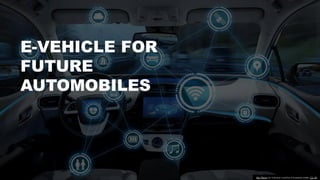
e-vehicle tech.pdf
- 1. E-VEHICLE FOR FUTURE AUTOMOBILES This Photo by Unknow n author is licensed under CC BY.
- 2. ELECTRIC VEHICLE (EV) An electric vehicle is a vehicle that uses one or more electric motors for propulsion … It can be powered by a collector system ,with electricity from extravehicular sources or it can be powered autonomously by a battery This Photo by Unknow n author is licensed under CC BY-ND.
- 3. History of e-vehicle • First model electric vehicle is attributed by many people • In 1828,hungarian priest and physicist anyos jedlik invented early type of electric motor and created a small model car powered by his new motor • In 1832 to 1839 ,scottish inventor robert anderson also invented a crude electric carriage • In 1835 professor sibrandus stratingh ,the netherlands and his assistant chistopher becher also created a small scale electric car, powered by non rechercable primary cells • The first electric car in the us was developed in 1890-91 by william morrision • The first electirc vehicle in india was a three wheeler,invented by scooter 's india pvt ltd,it was named VIKRAM SAFA
- 4. Why electric vehicle INCREASING AUTOMOBILES DECLINING OIL RESERVES INCREASING GREENHOUSE EMISSIONS, GLOBAL WARMING,CARB REGULATIONS SOLUTION: IMPROVE THE EXISTING POWER SYSTEM EFFICENCY, ALTERNATE FUELS ,ALTERNATE POWER SYSTEM LIKE ELECTRIC VEHICLE This Photo by Unknow n author is licensed under CC BY.
- 5. Electric vehicle concept EV is a road vehicle based on modern electric propulsion consisting of electric machine ,power electronic converters ,electric converters,electric energy sourcesand storage devices and electronic controllers EV is a broad concept ,including BEV, HEV, FCEV,etc... Regenerative breaking is possible in EV's EV is not only just a car but a new system for our society's clean and efficient road transportation EV is an intelligent system which can be integrated with modern transportation networks EV design involves the integration of art and engineering ; This Photo by Unknow n author is licensed under CC BY-SA-NC.
- 6. Comparisonwith internalcombustion enginevehicle • Electric cars are generally more expensive than gasoline cars. The primary reason is the high cost of car batteries running costs and maintenance • Electric cars produce no pollution at the tailpipe, but their use increase demand for electricity • Internal combustion engines are relatively inefficient at converting on-board fuel energy to propulsion as most of the energy is wasted as heat as compared to electrical engines • Electric cars produce less roadway noise as compared to vehicle propelled by internal combustion engine
- 7. Advantage of electric car
- 8. Disadvantage of electric cars
- 9. FUTURE The future of battery electric vehicle depends primarily upon the cost and availability of battery with high specific energy, power density, short charge time and long life ,as all other aspects such as motors, motor controllers with internal combustion engine components I. Li –ion II. Li –poly III. Zic air batteries have demonstrated specfic energy high enough to deliver range and recharge times comparable to conventional vehicle. This Photo by Unknown author is licensed under CC BY-SA-NC.
- 10. Future of e-vehicle in India • About two in every 100 cars sold today are powered by electricity • The global EV fleet totaled 8.0 million with EVs accounting for 1% of the global vehicle stock and 2.6% of global car sales • India is among the handful of countries that supports the global EV30@30 campaign ,which aims for at least 30% of vehicles sales to be electric by 2030 • It is estimated that by 2020-30 India's cumulative demand for batteries would be approximately 900-1100 G wh • The ministry of power has prescribed at least one charging station to be present in a grid of 3 km and at every 25 kms on both sides of the highways • India's transport sector besides ,complying with its target of net zero emissions by 2070 This Photo by Unknown author is licensed under CC BY-ND.
- 11. This Photo by Unknown author is licensed under CC BY-NC-ND.